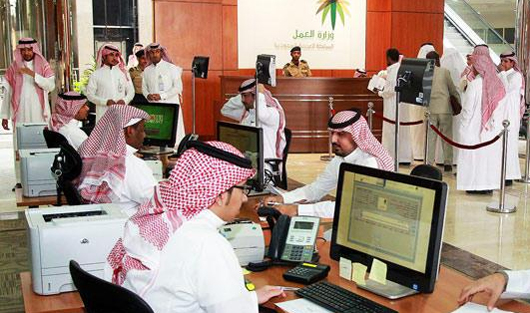
Riyadh, May 9: The Ministry of Labor plans to shift all its services online soon, including the paperwork for domestic workers, and early warnings for companies it decides to move into the Red Zone of the Nitaqat System, a ministry official has said.
“We are trying our best to improve the performance level of our services with ease of access ... that satisfies both customers and the ministry,” said Ziyad Al-Saegh, undersecretary for customer services and worker relations at the ministry.
Al-Saegh was speaking at a workshop to explain the ministry's e-services organized by the Riyadh Chamber of Commerce and Industry.
He said the ministry completed 11 million e-services requests over the past six months. The customer services section receives 110,000 complaints a month from employers through its call center, from 8 a.m. to 8 p.m. daily. Officials respond to queries in 12 seconds, he said.
He urged employers to keep their account passwords secret and maintain the confidentiality of their information.
Al-Saegh urged employers to monitor the activities of their liaison officers to ensure that no one tampers with their accounts at the ministry. He said employers must inform the ministry if their e-mail accounts are hacked. He also called on the RCCI to ensure that its members supply correct information to the ministry.
Al-Saegh admitted that the ministry had incorrectly suspended services for companies where their employees had expired permits because they left the country on exit-reentry visas. This was because of poor data sharing between the ministry and the Passports Department. However, updates were now taking place every 24 hours, which would solve this problem, he said.
Al-Saegh said the ministry is also trying to ensure it has access to information held by other government agencies, to make sure it does not cut services to companies that have renewed their municipal permits and zakat certificates. He conceded that the ministry has suspended services for some firms, and delayed resuming those of others, because it did not have access to updated information.
However, the ministry has an online link with the Ministry of Commerce and Industry to determine if companies have renewed their commercial licenses.
Al-Saegh said people should try to get appointments at branch offices rather than the main office in Riyadh because it is always busy. If they cannot get an appointment, they should file a complaint, he said.
The ministry would also in future provide firms with online advance warnings if they are going to be classified into the Red Zone of the Nitaqat System, have their services suspended, or if some documentation has to be renewed.
Al-Saegh said the ministry would in a few weeks introduce a system to have updated information on workers in jail. This would help ease problems for them. The ministry would deal with special individual issues separately.
He said sponsors would soon be able to complete the paperwork for domestic workers through the Musaned portal including recruitment, registering of data, and getting visas. Recruitment through private agencies would also be done online in future, he said.




Comments
Add new comment